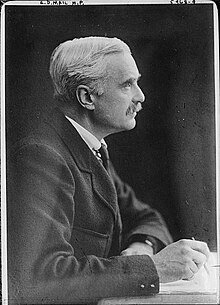E. D. Morel | |
|---|---|
 Morel, c. 1922 | |
| Member of Parliament for Dundee | |
| In office 1922–1924 Serving with Edwin Scrymgeour | |
| Preceded by | Winston Churchill Alexander Wilkie |
| Succeeded by | Tom Johnston Edwin Scrymgeour |
| Majority | 32,846 (26.5%) |
| Personal details | |
| Born | Georges Edmond Pierre Achille Morel Deville 10 July 1873 Paris, France |
| Died | 12 November 1924 (aged 51) North Bovey, Moreton Hampstead, Devon, England |
| Political party | Labour |
| Spouse |
Mary Richardson (m. 1896) |
| Children | 5 |
| Occupation | Journalist, author, politician |
Edmund Dene Morel (born Georges Edmond Pierre Achille Morel Deville; 10 July 1873 – 12 November 1924) was a French-born British journalist, author, pacifist and politician.[1]
As a young official at the shipping company Elder Dempster, Morel observed a fortune being made in the export of Congo rubber and the shipping in of guns and manacles. He correctly deduced that the rubber and other resources were being extracted from the population by force and began to campaign to expose the abuses. In collaboration with Roger Casement, Morel led a campaign against slavery in the Congo Free State, founded the Congo Reform Association and published the West African Mail. With the help of celebrities such as Arthur Conan Doyle and Mark Twain, the movement successfully pressured the Belgian King Leopold II to sell the Congo Free State to the Belgian government, ending some of the human rights abuses perpetrated under his rule.
Morel played a significant role in the British pacifist movement during the First World War, participating in the foundation of and becoming secretary of the Union of Democratic Control, at which point he broke with the Liberal Party. In 1917 he was jailed for six months for his antiwar activism, which had a permanent effect on his health. After the war, he edited the journal Foreign Affairs, through which he sharply criticised what he considered French aggression and mistreatment of the defeated Central Powers. As part of his campaign against the French, he became the most important English proponent of the Black Shame campaign, which accused black French troops of outrages against the population of the occupied Rhineland.
Morel was elected to Parliament in 1922 as a Labour candidate, defeating the incumbent Winston Churchill for his seat, and was re-elected in 1924, dying in office. Morel collaborated closely with future Prime Minister Ramsay MacDonald and was considered for the post of Foreign Secretary, though he ultimately acted only as an unofficial adviser to MacDonald's government.